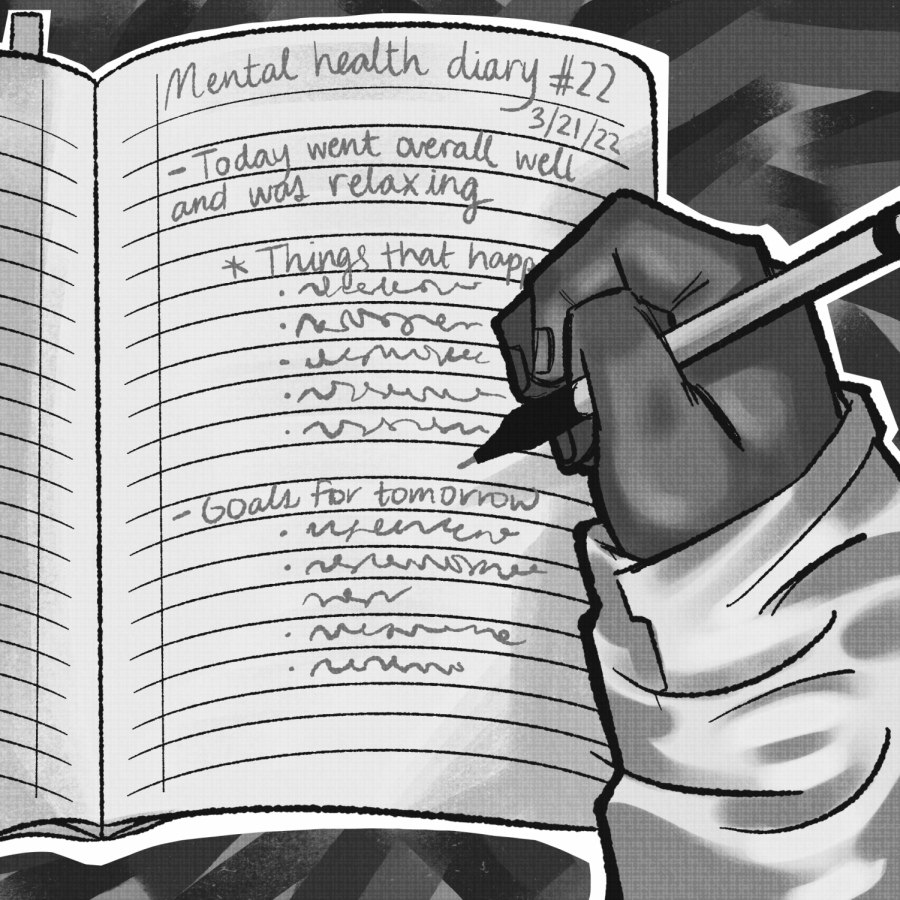[Opinion] Journaling is an important tool for mental health
Students find journaling mentally reinvigorating and helpful to improve wellbeing.
March 31, 2022
If you are contemplating a difficult choice, organizing a large project, or feeling confused, anxious, overwhelmed, or depressed, journaling can be an effective tool to channel these issues. Journaling is defined as the act of keeping a record of your personal thoughts, feelings, insights and more. It can allow people to step back and understand their emotions more clearly. Journals can be written, drawn, or typed and are a simple, low-cost way of improving your mental health.
One of the best ways to deal with any overwhelming emotion is to find a healthy way to express yourself. This makes journaling a helpful tool in managing your mental health. While journaling can be an amazing form of expression for anyone, individuals who struggle with stress, depression or anxiety can gain even more from using a journal.
Journaling can be a great tool to reduce anxiety as it has been proven that writing about your feelings is linked to decreased mental distress. According to a study conducted by the University of Rochester Medical Center, researchers discovered that individuals struggling with various medical conditions, alongside having anxiety, who wrote online for 15 minutes three days a week over a 12-week period had increased feelings of well-being and fewer depressive symptoms after one month. Their mental well-being continued to improve during the 12 weeks of journaling.
In addition to a reduction in anxiety, journaling can also allow individuals to learn more about themselves. Expressing yourself in a journal can bring your deepest thoughts, secrets and feelings to the surface. Oftentimes many people are surprised by what they write. For instance, you may discover that you’re worried about something you didn’t know was bothering you until you wrote it down.
Moreover, journaling encourages individuals to take control of their emotions and allows them to take an active role in their treatment. Today’s world is filled with uncertainty and the stress of life can often cause people to become depressed and lost in their emotions. However, when an individual puts pen to paper, they can calm down their mental chaos. When we write things down, they appear more manageable. Writing also helps to put things in perspective and lessen feelings of unhappiness. Overall, journaling can bring someone back to reality.
Also, journaling helps people realize when they are feeling worse and need extra help. A journal is a great tool to track symptoms of how you are feeling everyday. If you log your emotions everyday you may be able to spot things that may trigger you anxiety or depression.
For example, you may notice symptoms get worse at a certain time of day, when you’re under stress. If you know your triggers, you can avoid them in the future. Journaling may give you insight on how you’re doing over time. If you look back at older entries, you may notice trends. You can be able to see if you’re feeling better, worse, or the same. It can be a red flag that you need more help or reassurance that you’re doing good.
Another benefit of journaling is the positivity it can bring. Using gratitude and affirmation journals to write about happy memories and things that individuals are thankful for is a great method for staying grounded and recognizing life’s simpler pleasures. Writing about the positive can retrain your brain to focus on the good rather than the bad.
There are various tips that can help make journaling more effective. This includes carving out time to write in the journal and making a conscious effort to write in the journal everyday. While journaling may seem like a lot of work due to the misconception that individuals must write in it everyday, the positive effects of journaling can be felt even if it’s not done daily. Writing in the journal for just a few minutes will still have a positive impact.
Additionally, individuals can keep a pen and paper handy at all times in order to write on the go. It is also possible to keep a journal on your phone or computer which may be convenient for some. Bullet journaling is another great method for getting down all your thoughts. Bullet journals provide a space to organize schedules, reminders, to-do lists, brainstorming and other organizational tasks into a single notebook.
Lastly, there should not be strict rules about what you should or should not write. It should mention whatever someone feels is right. It is its own private place to discuss and create anything; words and ideas should flow freely without the worry of spelling mistakes or worries about what others may think.
Keeping this in mind, it is important to make sure that what you are writing does not become too negative; If you find yourself jotting down only negative thoughts, try to shift your writing in another direction. It is acceptable to write about things that aren’t positive, but it is smart to put a time limit on it.
While journaling can provide many benefits, it is also important to keep in mind the fact that journaling is just one aspect of a healthy lifestyle. To get the most benefits, be sure to relax everyday, eat a healthy diet, exercise regularly, get plenty of sleep and avoid alcohol and drugs.
Overall, it is clear that journaling is an effective tool for mental health as it allows people to express their feelings and work on their mental health.











